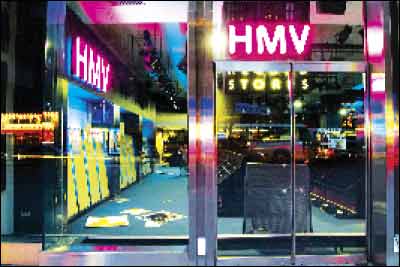
(Photo credit: Noah Sheldon)
Where music lives, read the sign in the HMV store at 46th Street and Fifth Avenue. Not anymore. Forty years after the first British music invasion, this one is ending quietly.
Starting in 1990, HMV, part of a larger London-based chain, staked its flag in virtually every retail hub of the city: first at 86th and Lexington and 72nd and Broadway, then in Times Square, Herald Square, 125th Street, and midtown. “They strategically saturated the market,” says Robin Abrams, executive vice-president at the Lansco Corp., a real-estate firm. With the addition of Virgin Megastores in Times Square and Union Square, Manhattan’s grid suddenly became chockablock with food courts for audiophiles.
The timing sucked. As the music business evolved, the big boxes’ simple business model—buy tons of CDs for $11 and sell them for $16—turned disastrous. The Internet struck the first blow, as online retailers offered lower prices and better selection. File-sharing and pay services like iTunes inflicted further damage, stealing away the kids; the 15–24 demographic, which bought one third of all music in 1994, accounted for just 21.4 percent of sales last year. (Untrendy old folks are now the dominant record-store buyers, which explains why Rod Stewart’s Great American Songbook Volume III was a recent top seller at the Tower Records in Trump Tower.)
Music retailers might have won back some of these customers by cutting prices, and they had a golden opportunity in 2003 when the Universal Music Group lowered its wholesale prices. But the stores generally decided against passing on the savings. Meanwhile, they faced new competition from the likes of Wal-Mart and Best Buy, which used cheap CDs to lure shoppers. The portion of music sold in record stores has fallen from 50.8 percent in 1998 to 33.2 percent.
Stuck with falling sales and rising overhead—annual rent at its 22,500-square-foot store on Fifth Avenue was about $1.5 million—HMV was forced to call it quits. But why did it fail while Tower Records and Virgin live on? The remaining big music stores in New York have different models. Tower, whose parent company went bankrupt this year, is for music enthusiasts. The blockwide store at Broadway and 4th has a Strand-like vibe—no frills and a huge selection put together by and for knowledgeable buyers. By contrast, the Virgin Megastore in Times Square is a glitzy loss leader. With their giant signs, the Virgin stores plug Richard Branson’s shagadelic empire. Plus, you can sign up for a Virgin Mobile cell phone, or pick up a $99.99 Virgin jacket. The key to surviving in the music-retail business these days is selling something other than music.